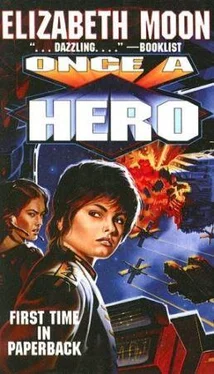Elizabeth Moon - Once a Hero
Здесь есть возможность читать онлайн «Elizabeth Moon - Once a Hero» весь текст электронной книги совершенно бесплатно (целиком полную версию без сокращений). В некоторых случаях можно слушать аудио, скачать через торрент в формате fb2 и присутствует краткое содержание. Жанр: Космическая фантастика, Боевая фантастика, на английском языке. Описание произведения, (предисловие) а так же отзывы посетителей доступны на портале библиотеки ЛибКат.
- Название:Once a Hero
- Автор:
- Жанр:
- Год:неизвестен
- ISBN:нет данных
- Рейтинг книги:3 / 5. Голосов: 1
-
Избранное:Добавить в избранное
- Отзывы:
-
Ваша оценка:
- 60
- 1
- 2
- 3
- 4
- 5
Once a Hero: краткое содержание, описание и аннотация
Предлагаем к чтению аннотацию, описание, краткое содержание или предисловие (зависит от того, что написал сам автор книги «Once a Hero»). Если вы не нашли необходимую информацию о книге — напишите в комментариях, мы постараемся отыскать её.
Once a Hero — читать онлайн бесплатно полную книгу (весь текст) целиком
Ниже представлен текст книги, разбитый по страницам. Система сохранения места последней прочитанной страницы, позволяет с удобством читать онлайн бесплатно книгу «Once a Hero», без необходимости каждый раз заново искать на чём Вы остановились. Поставьте закладку, и сможете в любой момент перейти на страницу, на которой закончили чтение.
Интервал:
Закладка:
A huff of annoyance from one of the officers. “And you have so much experience on so many ships!” he said, dripping sarcasm.
Chapin stood up. “Objection.”
“Sustained.” The chairman gave the speaker a disapproving look. “You are aware of the standards, Thedrun.”
“Sir.”
The chair peered at Esmay. “Please discuss the nature of the grumbling, Lieutenant Suiza. This court is not sure that an inexperienced officer is fully aware of the amount of grumbling that is normal.”
“Yes, sir.” Esmay paused, dragging up from the depths of her memory a few instances. “When Despite was in the yards, before I joined her, the recreation area had been cut by about thirty percent, to allow retrofitting of the enhanced charged beam generator on the portside. That meant losing fifteen of the exercise machines; it would have been nineteen, but Captain Hearne approved a tighter spacing. However, this meant shortening the exercise periods, and some crew could not get their required exercise without getting up on their down shift. Some complained that Hearne should have relaxed the exercise requirements, or installed the other machines elsewhere.”
“What else?”
“Well, there was apparently a sneak thief pilfering from enlisted lockers. That caused a lot of annoyance, because it should have been easy enough to catch, but the scanners never caught anything.”
“They’d been tampered with?”
“Chief Bascome assumed so, but couldn’t prove it. It went on for . . . perhaps twenty or thirty days . . . and then it never happened again. The items taken were rarely of great monetary value, but always personal treasures.” Should she mention that they’d been found after the battle, in the cleanup phase, in the locker of someone killed? Yes; she had been taught that withholding information was the same as lying. “We found the things after the battle,” she said. “But the person whose locker they were in had died in the original fight.”
“The mutiny, you mean.”
“Yes, sir. Under the circumstances, we just gave the stuff back to the owners—the surviving ones, that is.”
A grunt from the chairman, which she could not interpret.
The trial went on, hour after tedious hour. Most of the time the questions made sense, examining what she had known, what she had witnessed, what she had done. Other times the court seemed determined to follow some useless thread of inquiry—like the kinds of grumbling she’d observed—into a thicket where they would lodge until one of them kicked free and returned to the main issues.
One of the side-issues turned nasty. The hectoring Thedrun had continued to ask his questions as if he was sure she was guilty of something dire. He began asking her about her responsibility in regard to supervising the ensigns. “Isn’t it true, Lieutenant Suiza, that you were charged with ensuring that the ensigns carried out their duties and put in the required hours of study?”
“Sir, that duty rotated among the four senior lieutenants junior grade, under the supervision of Lieutenant Hangard. I was assigned that duty for the first thirty days after Despite left Sector HQ, then it devolved onto the next senior, Lieutenant Junior Grade Pelisandre for thirty days, and so on.”
“But as the senior, you were ultimately responsible—?”
“No, sir. Lieutenant Hangard had made it clear that he wished the jig—sorry—”
“Never mind,” the chairman said. “We do know what the word means.”
“Well, then, Lieutenant Hangard wanted the jig in charge of the ensigns to report directly to him. He said we each needed to feel the responsibility alone for a short time.” Where was this leading?
“Then you are not aware that Ensign Arphan was engaged in illegal diversion of military equipment?”
“What!” Esmay couldn’t keep her voice from reacting to that. “Ensign Arphan ? But he’s—”
“Ensign Arphan,” the chairman said, “has been convicted of diversion and illegal sale of military goods to unlicensed buyers—in this case, his father’s shipping company.”
“I . . . it’s hard to believe,” Esmay said. On second thought, she could believe it, but still . . . why hadn’t she noticed? How had someone else found out?
“You haven’t answered the question: were you or were you not aware that Ensign Arphan had illegally diverted military equipment?”
“No, sir, I was not aware of that.”
“Very well. Now, about the mutiny itself—” Esmay wondered why they bothered to ask questions which the surveillance cubes had already answered. Hearne had attempted to destroy all the records of her conversation with Serrano, but the mutiny erupted before she could. So the court had seen the playbacks, from several angles . . . for Serrano had of course recorded Hearne’s transmissions, and the transmissions agreed.
What seemed to worry the court most was the possibility that the junior officers had been plotting even before Hearne defied Serrano. Esmay repeated her earlier statements, and they picked them apart. How was it possible that she had not known Hearne was a traitor before? How was it possible that she had been party to a successful mutiny, if she had not been involved in some plan with the other mutineers ahead of time? Was it really that easy to produce a spontaneous mutiny?
By the end of the second day, Esmay wanted to bang heads. She found it hard to believe that a whole row of senior officers were so incapable of recognizing what lay in front of them—so insistent on finding something other than the plain, obvious truth. Hearne had been a traitor, along with a few others of the officers and some of the enlisted. No one had noticed because, up until the moment she defied Serrano, her actions had not been suspicious.
“You never had any suspicion that she was using illicit pharmaceuticals?” one of them asked for the third time.
“No, sir,” Esmay said. She had said that before. Captain Hearne had never appeared under the influence, not that Esmay would have been able to recognize subtle effects of drugs . . . even if she’d seen that much of Hearne. Esmay had no way to know what she was taking. Nor had she investigated Hearne’s cabin after the mutiny to find out. She had had a battle to fight.
More questions followed, on Hearne’s motivation; Major Chapin cut those off repeatedly. Esmay was glad to sit and let him handle it; she felt stale and grumpy as well as tired. Of course she didn’t know why Hearne might have turned traitor; of course she didn’t know if Hearne had been in debt, had had political connections to a foreign government, had harbored some grievance against Fleet. How could she?
Her own motivations came into question; Esmay answered as calmly as she could. She had harbored no grievance against Captain Hearne, who had spoken to her only a few times. When Hearne’s private log came into evidence, she found that Hearne had described Lieutenant Junior Grade Suiza as “competent but colorless; causes no trouble, but lacks initiative.”
“Do you feel you lack initiative?” asked the board chair.
Esmay considered this. Were they hoping she’d say yes, or no? What hook did they plan to hang her on? “Sir, I’m sure Captain Hearne had reason to think that. It is my habit to be cautious, to be sure I understand the situation fully before stating an opinion. I was, therefore, not the first to offer solutions or suggestions when the captain posed a problem.”
“You didn’t resent her opinion?”
“No,” Esmay said. “I thought she was right.”
“And you were satisfied with that?”
“Sir, I was not satisfied with myself, but the captain’s opinion seemed fair.”
“I notice you use the past tense . . . do you still feel the captain’s evaluation of you was accurate?”
Читать дальшеИнтервал:
Закладка:
Похожие книги на «Once a Hero»
Представляем Вашему вниманию похожие книги на «Once a Hero» списком для выбора. Мы отобрали схожую по названию и смыслу литературу в надежде предоставить читателям больше вариантов отыскать новые, интересные, ещё непрочитанные произведения.
Обсуждение, отзывы о книге «Once a Hero» и просто собственные мнения читателей. Оставьте ваши комментарии, напишите, что Вы думаете о произведении, его смысле или главных героях. Укажите что конкретно понравилось, а что нет, и почему Вы так считаете.












